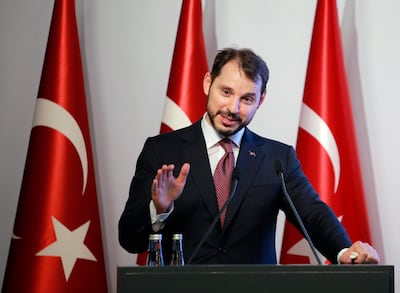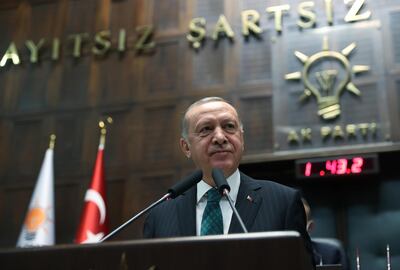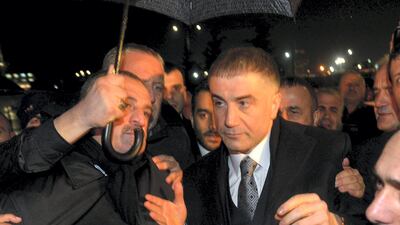“My dear brothers, my dear friends,” the Turkish mafioso, grinning ear to ear, says to open his latest YouTube video, which drew five million views in less than 24 hours. “Here we are again.”
Forget beloved dizis, or soap operas, such as Magnificent Century. Say hello to Sedat Peker, Turkey's new viral video sensation. Two parts Tony Soprano, the fictional American mobster, and one part The View, the American talk show, this shady figure has emerged as a media phenomenon in recent weeks by simply sitting at a table and talking to the camera.
His videos, which have nearly doubled in length since the first 40-minute release two weeks ago, cast a subtle spell. To start with, Peker is perfect for the part. The innocent schoolboy haircut, the open-collared shirt and rotating silver necklace attachments, including Zulfikar, the sword of Ali, which may be a reference to Ottoman Janissaries.
The massive rings on his thick, stubby fingers. The deep-set eyes, suggesting a history of violence, too many late nights, or both. The contradiction of an Islamist ultra-nationalist convicted criminal who presents himself as a neo-Robin Hood.
Peker is exiled from Turkey, his whereabouts unknown, and his comfortably bland, windowless setting maintains the mystery. The bamboo poles behind him evoke his 2007-2014 imprisonment, for forgery, robbery and leading a criminal organisation. On the clear glass table lay a stack of notes and a series of neatly arranged envelopes – an apparent threat to any who might cross his path.
But the real attraction appears to be how he spills the beans on ruling Justice and Development Party (AKP) insiders and their alleged links to a shadowy underworld. As the outlook for the AKP and its parliamentary partner, the far-right Nationalist Movement Party (MHP), has sagged in the past two years, along with Turkey’s economic state, mafia figures have returned to political prominence as an underground economy has breathed new life.
Last year, convicted murderer Alaattin Cakici was released from prison as part of a Covid-19-related amnesty and was soon denouncing government critics and receiving public support from MHP leader Devlet Bahceli. In his six videos so far (the seventh appeared on Sunday, as this column went to press), Peker has lifted the curtain on a series of alleged clandestine plots involving rape, murder, drug smuggling and more.

His main targets are former interior minister Mehmet Agar, current Interior Minister Suleyman Soylu, and the so-called Pelican group, a secretive wing of the AKP rumoured to be led by Berat Albayrak, President Recep Tayyip Erdogan’s son-in-law and former treasury and finance minister.
Peker had served as the AKP’s hatchetman, verbally attacking the party’s critics and rivals, until he was reportedly pushed out. In 2016, as hundreds of academics took a stand against Turkey’s military assault on Kurdish militants in the south-east, Peker vowed to “bathe in their blood”. A year ago, Peker defended Mr Soylu after the latter threatened to resign for Covid-19 failures. Now he shares photos of Mr Soylu at a mafia figure’s wedding and vows to attack the interior minister every week.
Peker saves his harshest venom for Mr Agar and his son Tolga, a member of parliament for Elazig, like his father before him. He says the two seized a Bodrum marina last year to profit from illicit trade and accuses them of killing a 21-year-old Kazakh journalist who had interviewed Tolga and then covering it up to look like a suicide. Peker describes Mr Agar as the head of Turkey’s deep state.

This is surely a reference to a 1996 car accident that exposed the Turkish government’s embrace of ultra-nationalist crime figures as a paramilitary unit. Outside the village of Susurluk, Huseyin Kocadag, the Istanbul deputy police chief, Abdullah Catli, a known Grey Wolf and mafia hitman who was carrying six sets of identity documents, and Catli’s mistress, the beauty queen Gonca Us, were found dead alongside the car’s injured owner, Sedat Bucak, an MP for the True Path Party (DYP). The interior minister at the time was the DYP’s Mehmet Agar, who resigned five days later.
Opposition politicians assert that Peker’s revelations are even bigger than Susurluk. That remains to be seen, but what is clear is that his timing could hardly be better. Turkey was under its harshest lockdown yet when they began to trickle out, with people stuck at home and craving novel entertainment. “Brothers and sisters,” Peker likes to say, conspiratorially, “nothing is what it looks like.”
His videos distract from the lingering Covid-19 threat, increasing poverty and a problematic judicial system, as exemplified by last week’s extension of philanthropist Osman Kavala’s three-year detention. They also offer a people facing significant curbs on free expression – witness the 130,000 probes into insults against the president – the vicarious thrill of a former insider publicly taking down top officials.
This possibly explains why the mafioso has yet to criticise Mr Erdogan – likely because his 15 minutes of fame will last only as long as Turkey’s president allows it. Consider that while Mr Soylu describes Peker as “mafia scum”, Mr Erdogan's spokesman, Ibrahim Kalin, says he is a “mafia person”. According to a recent report from Freedom House, the Turkish state is able to track down and capture suspected terrorists from Kosovo to Kenya. So one imagines it might be able to get a bead on a well-known crime boss posting viral videos every few days.
In one poll after another, Mr Erdogan and the AKP have hit new lows. In the latest, Mr Erdogan was easily bested by not one but three rivals in proposed head-to-head contests for the presidential election set for June 2023. Mr Erdogan may view Peker as helping place the blame for the AKP’s political failures and Turkey’s economic troubles on Mr Albayrak, Mr Soylu and other AKP parliamentarians, who could then take the fall.
Last week, Mr Soylu asked prosecutors to investigate Peker’s allegations, a move that some observers saw as a prelude to the interior minister’s resignation. The extent to which Peker’s claims are true is impossible to know, but he has offered impressive detail and presented recordings of a pro-government journalist and others to support his allegations.
He has also confessed to his involvement in criminal activities, such as an assault on a former MP and an attack on an opposition newspaper. In addition, Turkey’s T24 news site reports that the underground economy in Istanbul has increased from $3 billion in 2015 to $10bn in 2020, which suggests a growing mafia presence in the country.
Rumour has it that Peker will release 12 videos in all, and the Turkish public is sure to gobble them up. Already on social media they have been studying each like a 21st-century Rosetta Stone, or an episode of Lost. "I've started a new #SedatPeker series," Turkish Twitter user Papatyamm said on Sunday. "Please don't give me any spoilers."
A web page on GoodReads, the leading book review and publishing information site, lists the books Peker has placed on his table for each video. The two Mario Puzo novels and a Godfather sequel are no surprise. But a non-fiction work by the late American journalist Mike Marqusee stands out.
Titled Wicked Messenger in English, the book is about the American singer-songwriter Bob Dylan's artistic evolution in response to the disturbances of the 1960s. "He can no longer tell the story straight," writes Marqusee, "because any story told straight is a false one."
David Lepeska is a Turkish and Eastern Mediterranean affairs columnist for The National


